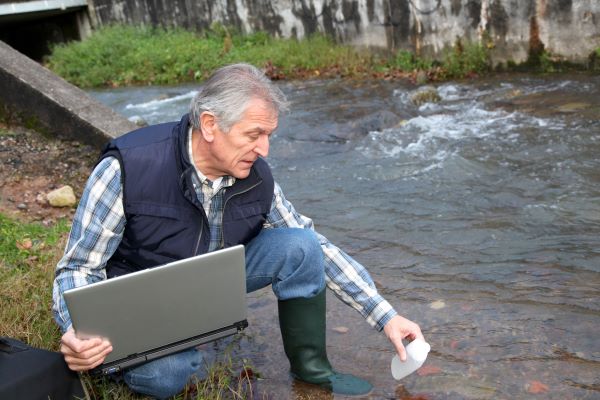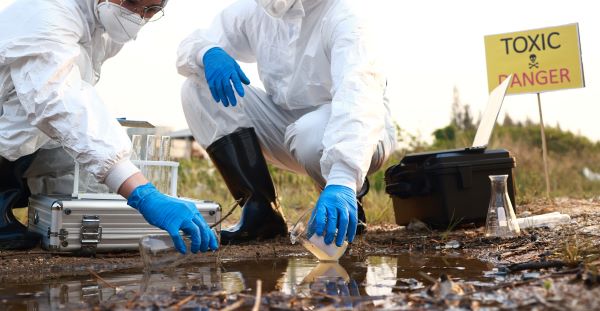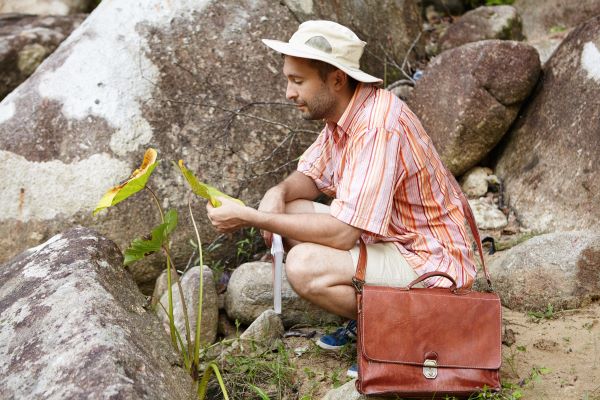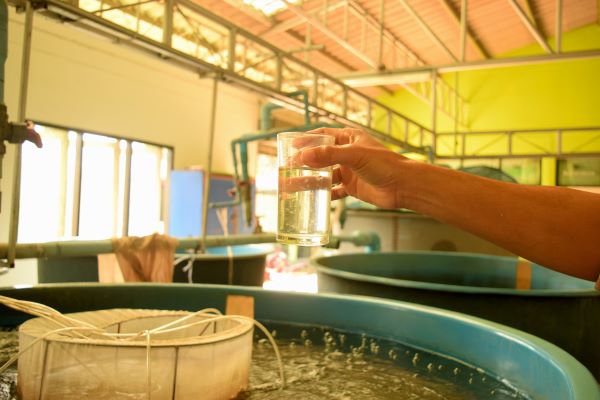Do you consider yourself an environmental activist? Maybe you’re just someone who loves being close to the great outdoors. Either way, your enthusiasm for the natural world is a big part of who you are. Indulge your passion for going “green” with one of these nature careers. In these jobs working in nature, you can really make a difference.
What is a nature career? You can earn a living through contributions like:
- Conserving natural resources
- Stopping pollution
- Making agriculture more environmentally friendly
- Making clean energy and recycling efforts a reality
Read on to learn more about 10 excellent “green” careers in nature and find out which one is right for you.
1. Environmental Engineer

Some high-paying environmental jobs include the various roles environmental engineers play.
Environmental engineers are professional problem-solvers who focus on the natural environment. They dig – sometimes literally – into the causes of environmental issues.
Some of the issues environmental engineers research include:
- Acid rain
- Pollution
- Climate change
- Waste management
- Ozone layer depletion
Once environmental engineers understand the cause of the problem, they search for ways to fix it.
How do potential applicants develop the knowledge and skills necessary to succeed in solving problems like unsafe drinking water, global climate change and public health threats? Aspiring environmental engineers need a college education.
Bachelor’s degree programs in environmental engineering typically include coursework in subjects like:
- Biology
- Chemistry
- Soil science
- Engineering principles and applications
Entry-level environmental engineering positions usually don’t require candidates to hold a Professional Engineering (PE) license, according to the United States Bureau of Labor Statistics (BLS). Many environmental engineers attain a license later in their careers.
Environmental engineering is a great green career path because the mission of these professionals’ work is to help the environment. They use their knowledge of science and engineering to search for solutions to environmental issues across the globe. They may, for example, seek ways to repair damage to an ecological system. Environmental engineers may also search for ways to save ecosystems from being harmed in the first place.
Environmental scientists develop solutions of all kinds. Sometimes this work entails designing new or improved containment systems for hazardous waste. Other times, environmental engineers look for new methods of generating energy. Some environmental engineers’ jobs involve developing water reclamation procedures. Other environmental engineers search for more effective recycling practices. An environmental engineer may ways to save animal habitats from harm. Designing sustainable systems for reducing pollution is another of the types of contributions environmental engineers make. Environmental engineering roles that involve the development of new chemicals to protect crops from harmful pests and diseases are among the best-paying jobs in agricultural chemicals industries.
Many environmental engineers enjoy working outdoors. However, they often have to divide their time between working in the natural environment, collaborating with project partners in offices and presenting ideas at seminars.
If there’s a particular ecological threat that concerns you, pursuing a nature career as an environmental engineer may allow you to specialize in studying and solving that issue.
Median Salary: $96,820 (2021)
Education Level: Bachelor’s Degree in Environmental Engineering
2. Hydrologist

What if you’re interested in environmental concerns that involve water? From water pollution to water scarcity, there are plenty of environmental issues of this sort. Hydrologist might be the right green career for you.
These scientists study how water moves. They use their knowledge to solve environmental problems related to water quality and quantity.
An undergraduate college education is essential for aspiring hydrologists. It’s not unusual for students interested in these nature jobs that pay well to pursue a graduate degree even before they enter the career field.
If you can’t find a school that offers a major in hydrology specifically, you’re not alone. There aren’t many such programs, the BLS reported. Many students instead look for a school that offers a concentration in hydrology. Hydrology concentrations may exist in earth science, geosciences or engineering programs.
Hydrology is a great career path for nature lovers. These jobs working with nature are involved in so many environmental issues, including the following:
- Droughts
- Floods
- Soil and land erosion
- Water pollution
Lack of access to clean drinking water is a major problem in some areas. Lengthy droughts can cause serious problems with farming, agriculture and fire hazards across the globe.
Studying water – and its movements, quality, and accessibility – is an important part of the field of hydrology. However, it’s just one aspect of the job. Hydrologists do more than just analyze water. They also work with scientists in various fields of study to research and develop plans for conserving, managing, and improving quality of and access to the water supply.
A career in hydrology requires a lot of hands-on work in the field. This means spending time outdoors. Hydrologists also often have the opportunity travel to new environments as they study water supplies and movements across the globe.
Median Salary: $84,030 (2021)
Education Level: Bachelor’s degree in Hydrology, Geosciences, Earth Science or Engineering
3. Environmental Scientist

Environmental scientist may seem like the most natural career path for a nature-lover to pursue. After all, these are likely the first jobs that involve nature most people think of.
Researchers and practitioners of environmental science use their college-level knowledge of the natural and physical sciences to study and solve issues that affect the natural environment.
There are numerous specialist roles within the field of environmental science.
RELATED: What Are the 5 Best Careers in Environmental Science?
Environmental chemists analyze how chemicals affect the natural world. They often apply this knowledge to a mission like cleaning up contamination and pollution or hazardous waste management.
Environmental restoration planners manage pollution cleanup projects. Their job duties include establishing budgets, procedures and steps for completion.
Environmental health specialists focus on how environmental issues affect public health dangers.
Industrial ecologists work with companies in industries that often have a negative effect on the environment. These scientists establish practices that minimize the ecological harm.
Many environmental scientists begin their jobs in nature working lower-level roles in environmental science. For example, applicants often have experience in roles like the following:
- Laboratory technician
- Field analyst
- Research assistant
Advancing to higher-level roles in environmental science may require an advanced degree.
Environmental scientists play a role in understanding and addressing environmental problems of all kinds. They do the field work of gathering soil, water, plant and other samples for testing. Working in environmental science also encompasses laboratory work. In the lab, environmental scientists study samples and record data. They use their information to not only identify existing ecological issues but also predict possible future threats.
Some environmental scientists spend most of their time doing hands-on work to clean up polluted ecosystems. Others collaborate with public policymakers or private industry leaders to develop regulations and business practices that result in less of a disturbance to the natural environment. In either case, the occupation allows the professional to make a positive change on the environment, directly or indirectly.
Successful environmental scientists must have the analytical skills and self-discipline to present their findings in technical reports. They also need problem-solving and interpersonal skills for developing plans for resolving ecological problems and getting the message across to the public and government and business entities.
Median Salary: $76,530
Education Level: Bachelor’s Degree in Natural Science, Biology, Chemistry, Physics or Geosciences
4. Agricultural Manager

What job could be more green – literally – than growing the plant crops that feed families across that nation? Agricultural managers are the professionals who oversee the routine activities required to run a farm. These are also some high-paying jobs that work with plants and animals.
Whether they grow crops, raise livestock or both, agricultural managers play an integral part in the U.S. economy. Of course, they also contribute to the food supply.
Many agricultural managers start their careers by doing hands-on farm production work. They may begin gaining this experience during childhood or adolescence, particularly if they grew up living on a farm.
It’s become increasingly common for agricultural managers to have a college degree, the BLS reported. Many agricultural managers have at least an associate’s degree, if not a bachelor’s degree, in agriculture. Aspiring agricultural managers develop the analytical and critical-thinking skills they need to run the farm and the mechanical skills necessary to do hands-on farming work by taking classes like the following:
- Farm management
- Dairy science
- Plant breeding
- Agricultural economics
Coursework in the business of agriculture also helps students develop business skills.
It’s true that not all farming activities qualify as “green.” However, today’s farmers are met with a greater demand for organic food products and sustainable farming practices.
Agricultural managers hold leadership roles on farms. This puts them in a position to implement these changes and make farming more environmentally friendly than ever before.
After all, agricultural managers are rarely responsible for the actual planting, plowing, harvesting, herding and animal care tasks you most likely associate with farming. They focus instead on the big-picture concerns of running a successful farm. Agricultural managers’ mission will usually include determining answers to questions like the following:
- How the farm will spend its operating budget
- What crops to plant or animals to raise
- How to store and ship crops and livestock for sale
It’s an agricultural manager’s job to recruit and train farm workers. Their job duties also entail maintaining the farm, and all of the equipment necessary to run it, in proper working order. These are precisely the decisions that have the power to make the agriculture industry green.
Median Salary: $73,060 (2021)
Education Level: Bachelor’s Degree in Agriculture
5. Landscape Architect

Landscape architects design outdoor environments. The work of a landscape architect ranges from public parks to private home gardens.
The path to becoming a landscape architect is more rigorous than you might think. Most states have licensing requirements for landscape architects.
A college degree is a requirement. However, not any degree will do. Students typically need to choose a special degree. Either a Bachelor of Landscape Architecture (BLA) or Bachelor of Science in Landscape Architecture (BSLA) degree program can prepare applicants for this career.
To meet state licensing requirements, students usually need a degree from an accredited program. Accredited programs in landscape architecture can take up to five years of full-time study.
Like the architects who design buildings and bridges, landscape architects must complete extensive studio design work. This work involves building models and creating computer-aided designs. According to the BLS, aspiring landscape architects also study subjects like the following:
- Landscape ecology
- Surveying
- Geology
- Plant and soil science
- Landscape design and construction
Earning a degree may be just the first step to this career. Aspiring landscape architects may need to attain several years of training working under experienced landscape architects before they can meet the qualifications to take the Landscape Architect Registration Examination. Upon passing this exam, landscape architects can finally earn their licenses.
It’s important for the spaces designed by landscape architects to be visually and aesthetically appealing. That said, appearance isn’t the only thing that matters in their work. Many of the projects a landscape architect may work on help the environment in some way.
Landscape architecture projects often include adding plant life to the environment. In some cases, landscape architects install plants in places where plants are naturally lacking, like the rooftops of tall city buildings. They decide where on a site to put trees and other plants, as well as structures like walkways and buildings. Landscape architects also choose what plants to use for a project. Other projects focus specifically on restoring ecosystems that have been altered, polluted or destroyed by human activities or changes in the environment.
Aspiring landscape architects should be comfortable working both outdoors and in office environments. Landscape architects spend some of their work time at jobsites. They also spend a good deal of time in the office researching, creating designs and preparing budgets and reports, according to the BLS.
Median Salary: $67,950 (2021)
Education Level: Bachelor of Landscape Architecture or Bachelor of Science in Landscape Architecture
6. Wildlife Biologist

Are your environmental interests focused more closely on animals than plants or earth science? A career in zoology and wildlife biology might be what you’re looking for. Zoologist and wildlife biologist encompass some high-paying jobs with animals.
Wildlife biologists and zoologists study animals. Individual wildlife biologists often focusing particular types of animals, like mammals. They may also focus on groups of animals that live in specific habitats, such as oceans.
What education you will need for a career as a wildlife biologist depends on what you plan to do in the field. You can get an entry-level role in this field of science with just a bachelor’s degree. You’ll need a master’s degree if you aspire to conduct higher-level investigative or scientific work, the BLS reported. To advance into independent research or university research roles, you will need a Ph.D.
RELATED: Highest Paying Jobs With a Biology Degree – Degrees in Biology – Majors & Careers
Working with animals, in and of itself, may not be enough to make a career qualify as green. Still, the wildlife biology career path is certainly a green career.
Part of a wildlife biologist’s job is to observe the animals’ behavior, physical characteristics and interactions with its own kind and with other species. However, much of a wildlife biologist’s work focuses on conservation of the animals’ natural habitat and preserving the species.
These scientists keep tabs on the animals’ populations. They may implement breeding programs to increase the population of endangered species. Developing conservation plans is also a typical part of these jobs, according to the BLS.
Wildlife biologists even play a role in the development of alternative energy solutions. For example, imagine that a wind farm is being constructed. A wildlife biologist may assess how the turbines and construction could interfere with the local ecosystem. This assessment helps the biologist devise strategies to minimize the impact on the region’s birds and other animal life, the BLS reported.
Median Salary: $64,650 (2021)
Education Level: Bachelor’s, Master’s or Ph.D. Degree Zoology and Wildlife Biology
7. Conservation Scientist

Few careers are greener than that of a conservation scientist. In these jobs in nature, you would study the quality of natural resources and plan how to use those resources.
If a career as a conservation scientist sounds like the right choice for you, you’ll need to choose your college carefully. Employers may prefer applicants who have a bachelor’s degree from a program accredited by the Society of American Foresters.
The coursework in accredited programs typically covers subjects like the following, according to the BLS:
- Biology
- Ecology
- Forest resource measurement
- Computer modeling,
Some conservation scientists choose to pursue professional certification through the Society of American Foresters or the Society for Range Management. Professional certification is not required for these nature jobs, but it can be beneficial.
Conservation scientist is another occupation that allows workers to split their time between working outdoors and indoors. Conservation scientists may work extensively in the field. They often take long walks that require a great deal of physical stamina, according to the BLS. They also spend time in laboratories and offices. Here, they analyze data and draft plans for conservation projects.
As a conservation scientist, the main goal of your job would be to preserve the natural environment and its resources. In fact, many conservation scientists don’t just conserve existing resources. They actually work to improve resources, like making farmland more fertile for agriculture. Your work could include tasks like gathering and studying water, soil and plant samples. Developing strategies for using and conserving resources is also part of many jobs in conservation science. A conservation scientist may also oversee land use and harvesting contracts and practices.
With the right qualifications and experience, you might find yourself in a specialized role in conservation science. Specialized conservation science jobs include:
- Conservation land manager
- Range manager
- Soil conservationist
- Water conservationist
In specialized jobs in conservation science, scientists focus their efforts on preserving a particular land area or aspect of the natural world.
Median Salary: $63,750 (2021)
Education Level: Bachelor’s Degree in Forestry, Environmental Science or Agricultural Science
8. Limnologist

Limnologist probably isn’t a career you’re familiar with. It can, however, be a very rewarding nature career.
A limnologist is a type of scientist. In some ways, limnologist is similar to more well-known marine biologist career. Unlike the marine biologist, a limnologist studies the animals, plants and ecosystems that make up freshwater environments. Lakes and ponds – and their plant and animal inhabitants – the the subject of a limnologist’s study.
RELATED: What Degree Do You Need to Become a Marine Biologist?
How much money a limnologist makes can vary significantly based on two factors:
- The kind of work the limnologist does
- The industry and organization for which the limnologist works
A limnologist’s area of specialization also affects both job duties and earning potential. For example, limnologists who study freshwater animals can expect to earn a median wage similar to that of wildlife biologists, the BLS reported. Those who study the movement of water, instead, earn salaries more comparable to that of hydrologists. Limnologists with a chemistry focus may bring home a median salary that’s on par with chemists in other disciplines.
Limnologist is a very broad career path. Ecologists, environmental scientists, biogeochemists and various other kinds of scientists and researchers can all fall under the category of limnologists if they specialize in studying freshwater ecosystems.
Limnologist is an excellent career for nature-lovers. Many of the roles in this area of science include a focus on conservation.
For example, a limnologist who studies freshwater animal life might research the reasons behind a diminishing population of fish. They may also develop plans for increasing that population back to normal levels.
Limnologists also conduct experiments to determine what effects possible changes to the freshwater ecosystem could have on the environment. Examples of the kinds of changes limnologists study are the introduction of a new species of fish and changes in the diet of small organisms like plankton.
If you enjoy spending time in lakes and ponds, you will enjoy the fieldwork in these nature careers. Limnologists visit these environments to record measurements and gather specimens and water samples to study in the lab.
Median Salary: $63,625 (2023, job search website Zippia)
Education Level: Bachelor’s, Master’s or Ph.D. Degree in Biology or Chemistry
9. Wind Turbine Service Technician

Few things are greener than clean energy sources. Wind turbine service technicians are the maintenance and repair professionals whose work makes renewable wind energy possible. Another name for wind turbine service technicians is “windtechs.”
Wind turbine service technicians are responsible for examining, repairing and maintaining the turbines that generate renewable wind energy. For many wind turbine service technicians, the opportunity to work primarily outdoors is enjoyable.
However, the job is also physically demanding and can be dangerous. Industrial wind turbines are often hundreds of feet tall. Windtechs maintenance on very tall wind turbine towers. Replacing old or damaged parts is part of a windtech’s job. So is troubleshooting the various mechanical, electrical and hydraulic systems used to power the wind turbines. To do this work, windtechs need to know how to use safety harnesses and other equipment to safely climb the towers.
In 2021, windtechs held 11,100 jobs across the nation, the BLS reported. However, these nature careers are growing rapidly in America and across the globe. Jobs for windtechs in the United States should increase by 44% between 2021 and 2023, according to the BLS. That’s nearly nine times the 5% job growth rate for all occupations during that same period.
Many of the jobs on our top 10 green careers list are science-based and at least partly academic in nature, but windtech is an exception. Are you more comfortable fixing mechanical problems than studying samples in a lab? If so, wind turbine service technician is a career path that will fit both your technical talents and your love of nature.
This emphasis on technical skills also makes wind turbine technician one of the best jobs in nature without a degree. The BLS considers the minimum level of education for this nature career to be a postsecondary nondegree award. This means a training program from a community college or technical school that confers a certificate may be all you need to get started. If you would rather go for a degree, search for a wind energy technology program at the associate degree level.
Median Salary: $56,260 (2021)
Education Level: Associate’s Degree in Wind Energy Technology
10. Recycling Coordinator

Are you passionate about recycling? Why not turn your enthusiasm into a career as a recycling coordinator?
These labor management professionals oversee recycling efforts. Their work ensures that collected recyclables actually make their way to a facility where they can be transformed into something new or reused, rather than permanently discarded in a landfill.
Recycling coordinators establish recyclables collection schedules. They send workers to pickup routes. These nature-focused careers involve serving as a supervisor or manager for the employers who operate recycling collection trucks and processing facilities.
The earning potential for recycling coordinators can vary widely, the BLS reported. The lowest-paid recycling coordinators earn well below the median salary for all occupations. The highest-paid recycling coordinators can pull in six-figure salaries annually.
Certain factors make a big difference in salary for recycling coordinators. The size of the program the recycling coordinator is responsible for managing is one such factor. Another is the amount of experience the worker has. Even new recycling coordinators who oversee relatively small recycling programs find the work rewarding in non-financial ways. No matter the scale, their work has a positive impact on the environment.
Recycling coordinators help the natural environment in more ways than one. By planning and supervising recycling programs, they ensure that recycling efforts actually become a reality. Once the recyclables are collected and sorted, they need to make it to a facility that will actually use the materials to create another usable product. A recycling coordinator is behind this process, too. Part of their jobs is negotiating contracts to sell and transport the recycling materials to a facility that will use them.
An important aspect of any successful recycling program is public education and awareness. Making the public aware of the importance of recycling and which items can be recycled is critical. Education through community outreach is another job duty recycling coordinators must accomplish.
A passion for recycling is among the most important characteristics for a recycling coordinator to have. Recycling coordinators also need excellent skills in communication, data management and administration. They typically need a bachelor’s degree in a subject related to the environment. Past work experience in education, manufacturing, waste management or the government is also useful. In some states, recycling coordinators need to acquire state certification.
Median Salary: $57,860 (2022, O*NET)
Education Level: Bachelor’s Degree in Environmental Education or Environmental Resources Management
Every nature job on our environmental science careers list gives applicants a chance to make a difference. Whether your mission is to protect plant life or wildlife, combat pollution or clean up existing environmental issues, the contributions you make when you join these industries affect the natural world not just in the U.S. but across the globe.
Editor’s note:
Some green jobs have been around for decades. Others are relatively new and evolving all the time. If you’re seeking a job that’s environmentally friendly and will allow you the chance to help protect the natural world, you have plenty of options.
Choosing a career is a big decision. It’s important to consider all of the potential benefits and challenges of an occupation before you commit to it. Consider this list a guide for beginning your own research into the green career that’s right for you.
To learn more about these and other jobs for nature lovers, check out the Green Jobs Career Outlook articles published by the BLS. Unless otherwise stated, the BLS was the source for any employment, education, training, salary and career outlook information presented in this article.
Related Resources:
Top 10 Online Bachelor’s Degree Programs in Environmental Science
Best Paying Jobs With a Geography Degree
For Further Reading:


